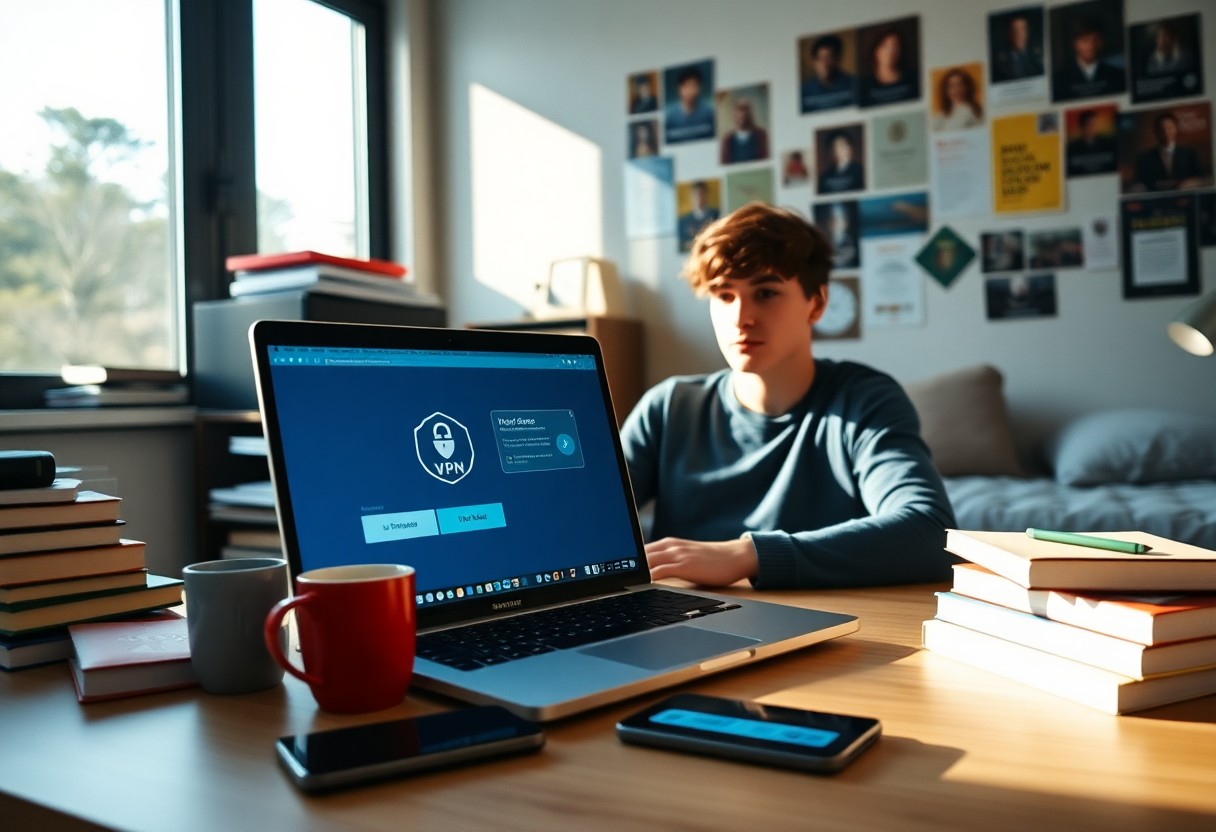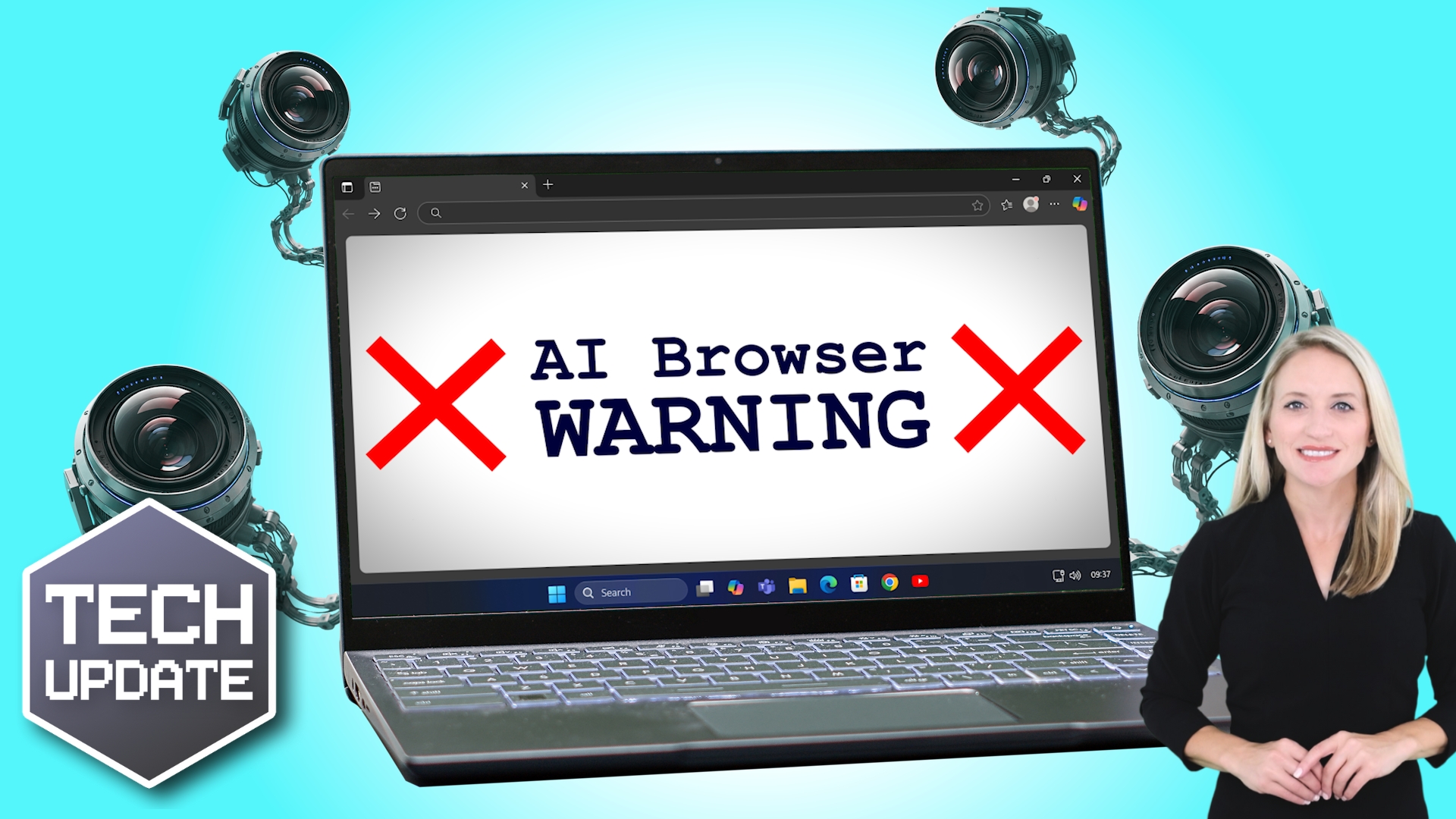You may not realize it, but using public Wi-Fi on campus can expose your personal information to various threats. Cyberattacks and data breaches are increasingly common, making it important to protect your online activities. By utilizing a Virtual Private Network (VPN), you can cryptographically encrypt your internet connection, ensuring that your sensitive data remains private and secure. A VPN allows you to browse the web with greater anonymity, making it an ideal tool for college students who value their online security. In this post, you’ll discover how a VPN can enhance your internet safety while studying in college.
Key Takeaways:
- VPNs encrypt internet traffic, enhancing privacy and security while using public Wi-Fi networks common in college settings.
- Using a VPN can help bypass geographic restrictions, granting access to educational resources and content that may be limited in certain regions.
- Some VPNs offer additional features such as malware protection and ad-blocking, providing an extra layer of security while browsing online.
The Dangers of Unsecured Campus Networks
Unsecured campus networks pose significant risks, as they allow potential intruders easy access to your data. Many colleges offer free Wi-Fi, making it convenient, but these networks often lack adequate security measures, putting your personal information, financial data, and academic work at risk. Attackers can easily intercept unencrypted data, leading to identity theft or unauthorized access to sensitive accounts.
Common Vulnerabilities on Campus Wi-Fi
Campus Wi-Fi networks frequently have vulnerabilities that can be exploited by malicious actors. Examples include weak passwords, lack of encryption protocols (such as WPA2), and reliance on default router settings. Additionally, many students fail to use network security best practices, like disabling file sharing, which can further expose your devices to potential attacks.
Real-World Examples of Cyber Threats in Colleges
Colleges have faced numerous cyber threats, including data breaches that compromised the personal information of thousands of students. For instance, a major university reported a data breach that exposed the Social Security numbers of over 3,000 students, leading to identity theft concerns. These incidents highlight the urgent need for improved security measures on campus networks.
One notable example occurred in 2019, when a prominent college experienced a ransomware attack that crippled its IT systems. The attackers demanded a hefty ransom, leading to significant disruption in classes and administrative operations. The institution ultimately chose to recover its data without paying the ransom, highlighting the importance of data backup and resilience planning. As more students connect to campus Wi-Fi daily, these threats are becoming increasingly sophisticated, underscoring the necessity for you to adopt protective measures, such as using a VPN, to safeguard your online activities.
How VPNs Enhance Privacy and Security
Integrating a VPN into your online activities significantly enhances your privacy and security during your college years. By masking your IP address, VPNs make it nearly impossible for third parties to trace your activity back to you. Additionally, many VPN services actively combat data logging and tracking, fostering a browsing environment that prioritizes your confidentiality. This means you can access academic resources, conduct research, and communicate with peers without leaving a trail of personal information that can be exploited.
Encryption Techniques and Their Importance
VPNs utilize advanced encryption techniques to transform your data into unreadable code, making it nearly impossible for unauthorized users to decipher. Common protocols like AES-256 provide military-grade security, ensuring that your online activities remain confidential. With this level of encryption, even if hackers intercept your data, they will find only scrambled information – a powerful deterrent against potential breaches.
Protecting Personal Information from Hackers
With the rise of cyber threats, protecting your personal information from hackers is paramount, especially on campus. By using a VPN, your sensitive information, such as login credentials and banking details, is shielded from prying eyes, including cybercriminals lurking on unsecured networks. VPNs create a secure tunnel for your data, offering real-time protection against data breaches and identity theft.
Cybercriminals are increasingly sophisticated, employing tactics like Man-in-the-Middle (MitM) attacks and packet sniffing to capture your data over public Wi-Fi hotspots. Universities often face high levels of cyber threats, making it important for you to secure your connection. A VPN’s end-to-end encryption not only protects your information from interception but also ensures that your browsing habits remain private. This means that as you connect to shared networks for assignments or socializing, your personal data is safeguarded, providing peace of mind in an environment where privacy breaches are all too common.
Choosing the Right VPN for Student Needs
Selecting a VPN tailored to your student lifestyle requires understanding your unique internet needs. Factor in whether you need access to region-locked content, the importance of fast connection speeds for streaming, or robust security features for safe browsing on campus Wi-Fi. The right VPN strikes a balance between affordability, usability, and effectiveness, ensuring you can surf the web securely without stretching your budget.
Key Features to Look For in a Student VPN
Opt for a VPN that meets all your academic and personal requirements. Consider the following key features:
- No-logs policy for privacy protection.
- High-speed servers for uninterrupted streaming and browsing.
- Multi-device compatibility for use on laptops, smartphones, and tablets.
- Affordable pricing options designed for students.
- Easy-to-use interface for quick setup and navigation.
- Customer support for assistance during your subscription.
Knowing these features will help you select the best VPN for your needs while studying.
Comparing Costs and Benefits for College Budgets
| Cost | Benefits |
|---|---|
| Monthly Subscription | Access to secure browsing and data protection |
| Annual Plans | Cost savings compared to monthly payment |
| Free Trials | Test features before committing |
Assessing your budget against the features and benefits of different VPNs can help you make a wise investment. A monthly subscription might seem appealing, but annual plans often provide a higher value in long-term savings. Some providers even offer free trials, allowing you to explore their services without financial commitment, ensuring that the VPN you choose meets both your financial and online safety needs.
Practical Steps to Set Up and Use a VPN
Setting up a VPN is straightforward, requiring just a few simple steps. First, choose a VPN provider that fits your needs and create an account. After installation on your devices—laptop, tablet, and smartphone—log in using your credentials. Most VPN applications offer a one-click connect feature for ease of use. Once connected, your IP address will be cloaked, allowing for safer browsing. Additionally, you can switch servers based on your location for optimal performance or access to region-locked content.
Installation Guides for Popular VPNs
Many popular VPNs, such as NordVPN, ExpressVPN, and Surfshark, provide user-friendly installation guides on their websites. These guides typically offer step-by-step instructions tailored for various devices and operating systems, ensuring a seamless setup. Whether you’re using Windows, macOS, or mobile platforms, you’ll find easy-to-follow directions, including troubleshooting tips and FAQs to assist you along the way.
Best Practices for Maximizing VPN Benefits on Campus
To fully leverage your VPN’s advantages while on campus, ensure that your connection is active whenever you’re using public Wi-Fi. Familiarize yourself with the various server options to choose the best location for speed or specific content access. Also, regularly check for updates from your VPN provider, as these often enhance performance and security. Keep your VPN app running in the background, maintaining protection without disrupting your online activities.
Utilizing features like split tunneling can also optimize your experience. This allows you to choose which applications use the VPN, reserving your bandwidth for imperative tasks such as streaming lectures while keeping other activity, like browsing, faster without the VPN. Additionally, consider enabling the kill switch feature, which will automatically disconnect your internet if the VPN connection drops, preventing any accidental exposure of your data. By implementing these techniques, you’ll maximize the safety and efficiency of your internet access, making your online experience both secure and seamless.
The Ethical Implications of VPN Use in Academia
Utilizing a VPN in an academic setting often raises ethical questions surrounding its use. While it can provide enhanced privacy and security, it also potentially enables students to engage in activities that violate institutional policies or copyright laws. For instance, using a VPN to access blocked resources or downloading pirated materials under the guise of anonymity can lead to serious repercussions, both academically and legally. As you navigate your academic life, it’s imperative to weigh the benefits against the ethical considerations of your internet behavior.
Navigating Institutional Policies and Guidelines
Your institution likely has specific policies regarding VPN usage, and understanding these guidelines is vital. Some schools may prohibit the use of VPNs, particularly if they interfere with the security of the university’s network. Review your institution’s acceptable use policy to ensure compliance and avoid potential disciplinary actions. Ignoring these guidelines can not only jeopardize your access but may also undermine the integrity of your academic work.
The Fine Line Between Privacy and Accountability
As far as VPNs, balancing personal privacy with institutional accountability is a delicate matter. While you may seek to protect your online activities, this can sometimes obstruct the transparency expected in academic environments. Schools monitor network traffic to ensure compliance with ethical standards; however, excessive privacy might raise suspicions about your internet actions. In navigating this landscape, it’s imperative to understand that while VPNs can shield your activities, they shouldn’t be a cover for unethical behavior.
Many universities maintain a network governance framework that requires students to adhere to ethical digital practices. For example, if your university has made specific content or services available exclusively to authorized users, using a VPN to bypass these restrictions could be construed as a serious violation of academic integrity. Institutions also track certain kinds of behavior to uphold a standard of student accountability. As you utilize VPN technology, consider how it aligns with your ethical obligations as a student. Always strive for a responsible approach that balances the need for privacy with your duty to uphold the values of your academic community.
Final Words
Ultimately, utilizing a VPN enhances your online security and privacy while navigating the digital landscape of college life. With increased risks associated with public Wi-Fi networks and potential data breaches, a VPN encrypts your internet connection, ensuring that your personal information remains protected. By taking this proactive step, you empower yourself to browse more freely and safely, allowing for a more focused and secure online learning experience. Prioritize your digital safety and make a VPN an integral part of your internet strategy during your college years.
FAQ
Q: How can a VPN enhance my online security while studying in college?
A: Using a VPN, or Virtual Private Network, helps safeguard your online activities by creating a secure, encrypted tunnel for your internet traffic. This means that any data you send or receive is protected from prying eyes, such as hackers or unauthorized network administrators. This is especially important in college environments where public Wi-Fi networks are common, making it easier for cybercriminals to intercept sensitive information. A VPN also masks your IP address, allowing you to browse anonymously and reducing the risk of tracking by third parties.
Q: Are there any disadvantages to using a VPN on campus?
A: While VPNs offer many benefits, they can come with some drawbacks. One common issue is reduced internet speed, as your data has to travel through the VPN server before reaching its destination. Some streaming services and websites may also restrict access or block VPN traffic, which can limit your ability to use these platforms effectively. Additionally, configuring a VPN can sometimes be complicated, particularly if the college’s network has specific restrictions or settings. It’s important to weigh these potential downsides against the increased security and privacy that a VPN provides.
Q: What should I look for in a VPN service as a college student?
A: When opting for a VPN, consider factors such as security features, speed, and ease of use. Look for a service that provides strong encryption protocols to protect your data, and ensure it has a no-logs policy to maintain your privacy. Additionally, a user-friendly interface and reliable customer support can greatly enhance your experience. Ideally, choose a VPN that is compatible with multiple devices, as you may need to use it on your laptop, smartphone, or tablet. Lastly, research if the VPN allows connections from different geographical locations, which can assist in accessing region-locked content for your studies or entertainment.



